Disclosure: Sportshubnet is supported by its audience. When you purchase through links on our site, we may earn an affiliate commission. Learn More.
In this post, we will check out the top 10 best keyword research tools for SEO in 2023.
Keyword research is a crucial component of any successful search engine optimization (SEO) strategy.
It involves identifying the words and phrases that people use when they search for information related to your business, products or services.
By optimizing your content for these keywords, you can increase your website’s visibility and attract more traffic.
However, conducting effective keyword research can be a daunting task, especially if you’re new to SEO. Fortunately, there are many keyword research tools available that can help you identify the most relevant and valuable keywords for your website.
These tools can save you time, provide you with valuable insights, and help you stay ahead of your competitors.
In this article, we’ll introduce you to 10 of the best keyword research tools for SEO in 2023. These tools are widely used by SEO professionals and are known for their accuracy, functionality, and user-friendly interfaces.
Whether you’re a seasoned SEO pro or a beginner, these tools can help you find the keywords you need to rank higher on search engine results pages (SERPs) and attract more visitors to your website.
Table of contents
What is a Keyword Research Tool?
A keyword research tool is a software application designed to help businesses and marketers find the most relevant and profitable keywords to use in their digital marketing campaigns.
These tools typically provide data on search volume, competition, and suggested bid prices for specific keywords, as well as related keywords and phrases that may be useful for targeting.
Keyword research is a critical aspect of any digital marketing strategy, as it helps businesses to understand the language and behavior of their target audience, and to optimize their website and content for search engines.
By identifying the keywords and phrases that potential customers are using to find products or services in their industry, businesses can create more targeted and effective marketing campaigns that drive traffic, leads, and sales.
There are many different keyword research tools available, ranging from free options like Google’s Keyword Planner to more advanced paid tools like Ahrefs, SEMrush, and Moz.
These tools use a variety of data sources and algorithms to provide keyword suggestions, search volume estimates, and competition metrics for specific keywords and phrases.
Ultimately, the goal of a keyword research tool is to help businesses find the right keywords to target in their digital marketing campaigns so that they can reach the right audience with the right message, and ultimately drive more traffic, leads, and revenue for their business.
What makes the best keyword research tool?
A keyword research tool is a tool used to help you find the best keywords for your website.
Keyword research tools can be used in a variety of ways, including:
Finding long-tail keywords that will help you rank higher in search engines.
Finding low-competition keywords that you can use as part of an SEO strategy.
Understanding what people are searching for and how they’re searching for it so you can create better content and messaging on your website.
10 Best Keyword Research Tools For SEO 2023
1) SEMrush
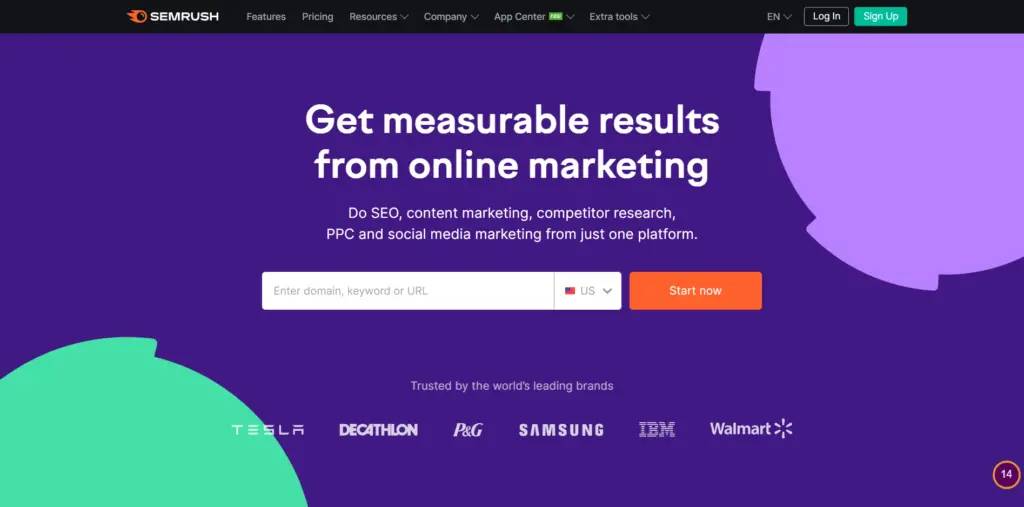
SEMrush is a complete SEO tool suite to carry out keyword research and improve your SEO rankings.
It provides data for organic search engine results on Google, Bing, Yahoo!, YouTube, Amazon, and more.
It also offers tools for local SEO like listing management to get your business data automatically distributed to the most authoritative directories.
Position tracking feature of Semrush tracks ranking positions of your keywords with ease with daily email updates.
Keyword Magic Tool is one of the best free tools for conducting efficient keyword research and generating highly targeted lists of keywords with maximum search volume potential in less than 60 seconds.
Semrush helps you find long-tail keywords by proposing new phrases or synonyms derived from user suggestions.
In other words, it’s easy to get a quick snapshot of how many people are looking for something like a coffee cake recipe versus a soup recipe.
2) KWFinder
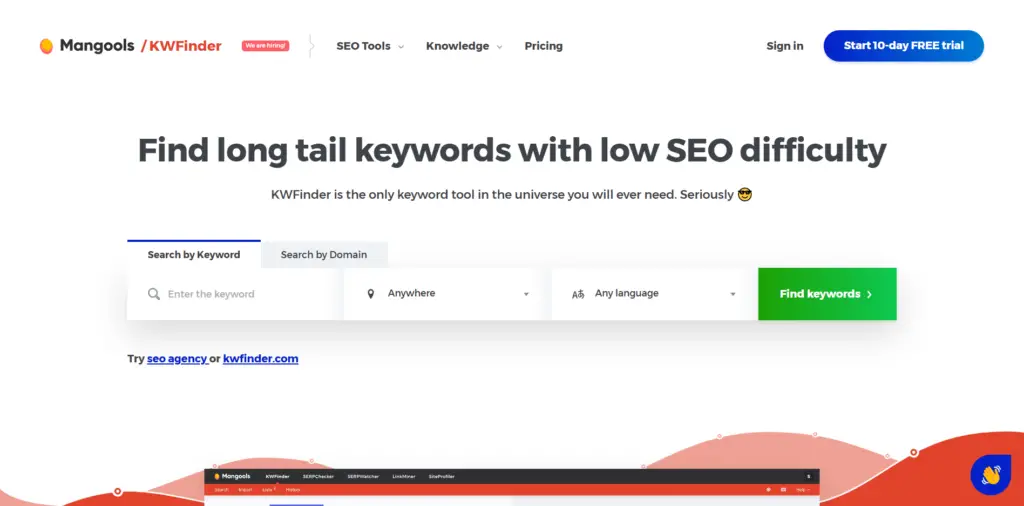
KWFinder is a tool developed by Mangools – a creator known for providing the best keyword research tools across types.
It delivers accurate results without any hassles and limitations. One of its most sought-after features is its ability to discover the keyword on the basis of location and language.
In addition, it can also give you access to long-tail keywords that are worth your time and energy to pursue.
Mangools has an inbuilt browser extension that works on both Chrome and Firefox browsers, which makes it convenient to use in any location or situation where you may need it the most.
The extensions help you to see backlinks of the current page, check domain strength, on-page analysis, and essential rank tracking data.
As such, it’s ideal for both freelancers and agencies who work on projects involving search engine optimization (SEO).
When it comes to cost, they offer three different plans: $29.90/month, $39.90/month, and $79.90/month. It is still the cheapest option compared to the price of tools like Ahrefs.
3) Ahrefs

Ahrefs is another popular keyword research tool that delivers identical features to SEMrush. It lets you do research on your own site, the competition, and the search volume for an offered term or phrase.
The data provided by Ahrefs can be used for blog posts, articles, content marketing, and much more.
You also have the option to do the competitor’s analysis to grow your blog to the fullest. Competitor analysis helps you find referring domains, backlinks, organic keywords, and competitors’ most popular content.
One thing I really like about Ahrefs is its ability to provide a summary of the latest links pointing back to your website. These are perfect for things like online PR campaigns because they show all the relevant information in one spot.
Finally, one of my favorite features of Ahrefs is their domain vs domain comparison tool. I find this particularly useful when looking at two sites with a lot of similarities in terms of traffic. Domain vs domain lets me quickly see which domain has better backlinks and who ranks higher.
Overall, I recommend using both Ahrefs and SEMrush since they each offer unique insights into SEO performance. Additionally, these tools let you track keywords over time which is extremely helpful when developing an SEO strategy.
4) Serpstat
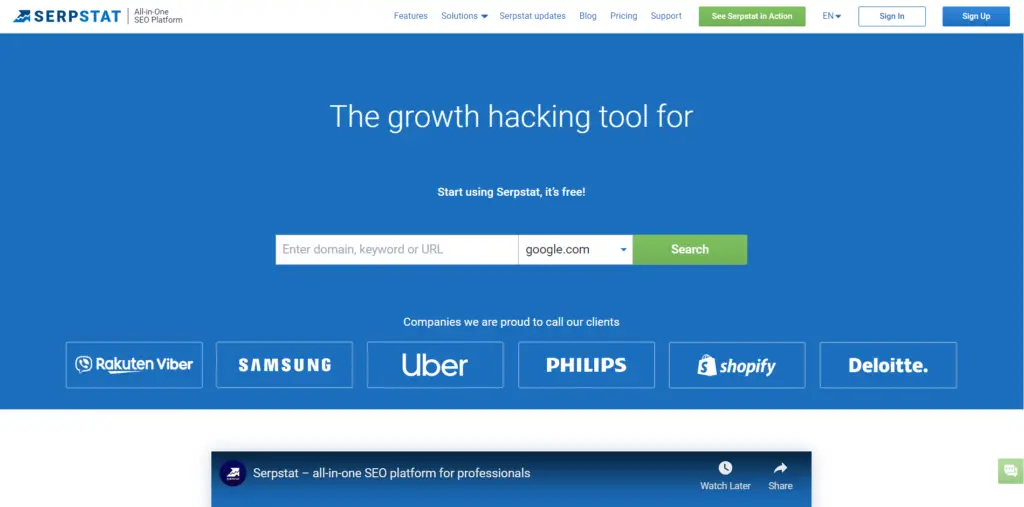
If you’re digging for a complete SEO tool, Serpstat is an ideal option that combines website analytics, keyword research tools, SERP analysis, backlink analysis, a rank tracker, and website audit features.
What’s more, the service also o provides link-building features and other tools to help you increase your search rankings on Google.
As with any service in this industry, Serpstat does not come cheap – pricing starts at $55 per month with discounts for annual subscriptions.
However, if you’re looking for complete SEO functionality in one place, Serpstat is worth checking out. In addition to keyword research, it includes analytics, link-building tools, and ranking monitoring.
You can also view tons of details about your competitors for a particular keyword, with an articulation of how visible they are and from where their visitors are coming.
5) Moz Keyword Explorer
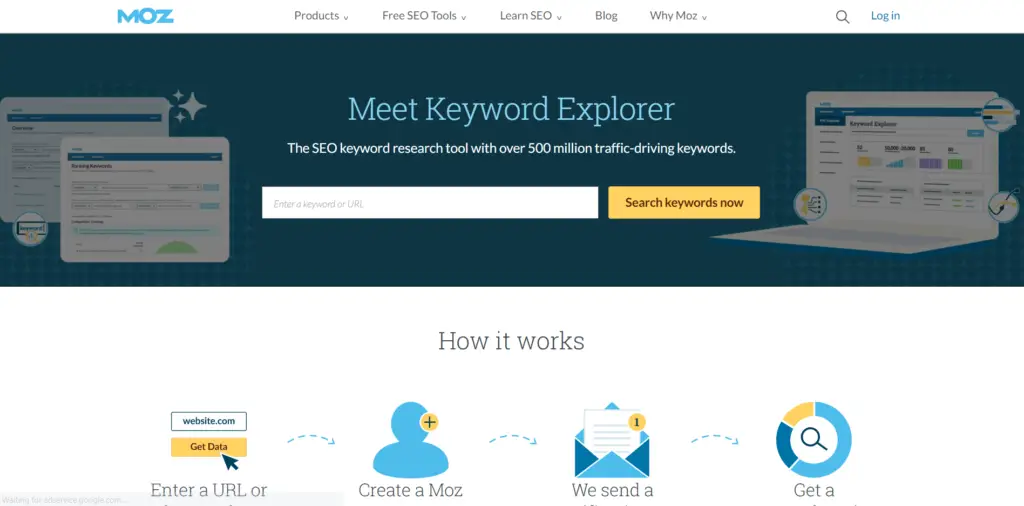
The Moz Keyword Explorer does up the best when it comes to keyword exploring. It allows you to explore phrases, words, or keyphrases and see what the volume is, who is bidding on them and how much contest there is for each keyword.
You can also download a CSV file of the results so you can plug them into your own marketing campaigns.
Exporting your rankings data to CSV can allow you to dig deeper into the data and directive trends across your stalked search engines and ranking pages.
You can export your rankings data from the Rankings section of your Campaign via the link to the right of your Tracked Keywords Overview.
Some other features include filtering by the keyword country. This click-through rate feature shows the number of clicks you’re anticipated to attract on page 1 of Google.
6) Keyword Tool.io
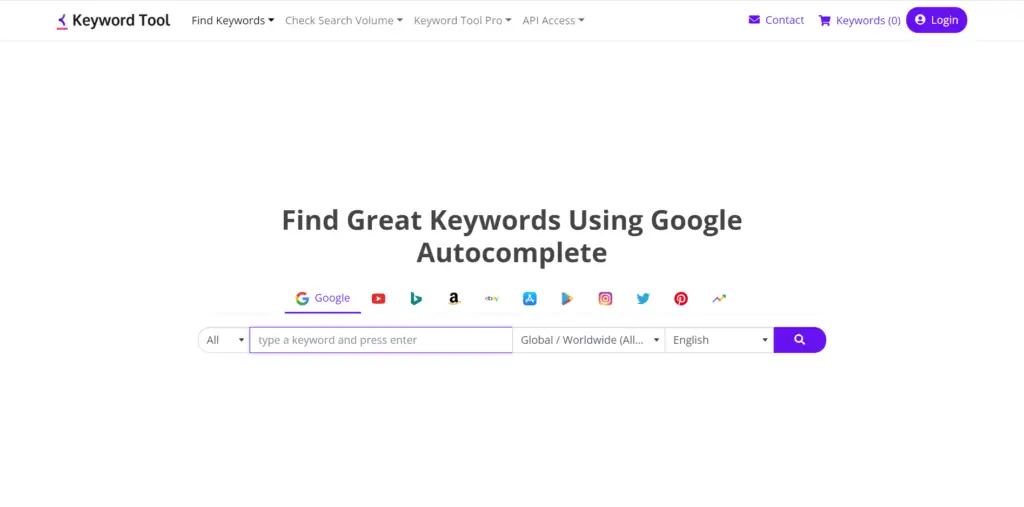
KeywordTool.io is a long-tail keyword research tool that can deliver thousands of keyword suggestions from real user queries.
Knowing how to pick the right ones is key. If you’re a retail store, for example, your product might be niche enough that it doesn’t matter which words you rank for because people will know exactly what it is when they see it.
But if you’re a startup or looking to grow into a new market then understanding what people are searching for and ranking for those terms is essential to success.
Start off by thinking about what words you want to rank for. Then do some competitive research so you know who your competitors are ranking for and where they’re getting their traffic from. With this information, go back to Keyword Tool and plug in your desired keywords.
When you search keywords in this tool it will let you explore search volume, trend, average CPC, and competition. The number next to each one tells you its monthly search volume.
7) Ubersuggest
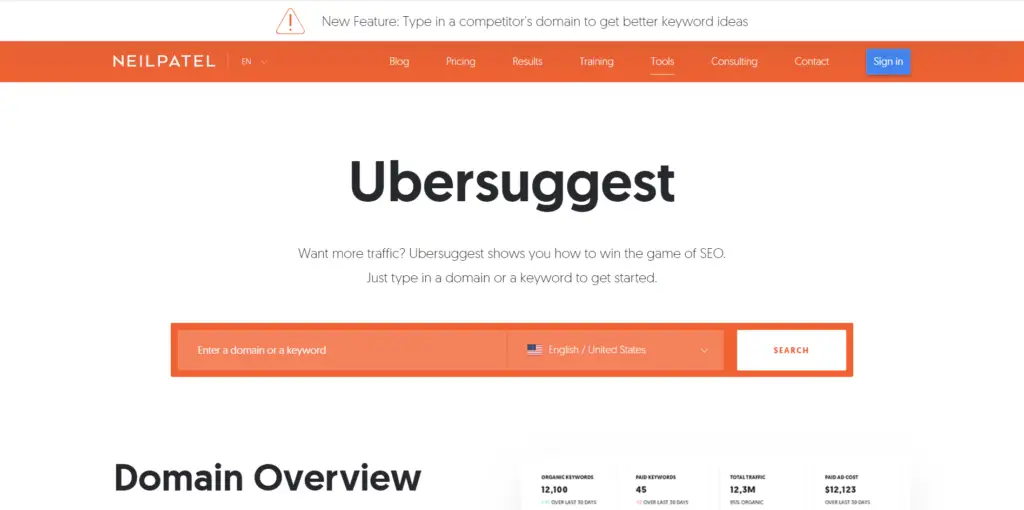
Ubersuggest is a free tool from Neil Patel that shows search volume data, keyword suggestions, a view of how hard your keyword will be to rank for, and a lot more.
It’s great for getting ideas or narrowing down your list of potential keywords to target. If you have an idea of what your niche might be, then you’ll know which keywords are easier to rank for than others.
If you’re still not sure what topic you want to write about, start by looking at the trending searches on Ubersuggest.
It doesn’t matter if you end up writing about both of them because most niches are broad enough to cover multiple topics, but if there’s one in particular that really catches your eye, go with that.
With this tool you will get to see lots of recommendations for related keywords, you can also able to view the top 100 Google results for that keyword, with calculated visits, a number of backlinks, a domain score, and a total number of social shares.
8) Google Trends

Google Trends is a website by Google that explores the rage of top search queries in Google Search across various areas and languages.
The website uses graphs to compare the search volume of different queries over time and displays lists of related searches.
You can filter your results by category, like news, shopping, or videos. You can also see trending videos on YouTube with an option to filter out music videos.
If you have a product idea and want to do some research before launching it, then this might be helpful for you.
I would recommend going through trending questions on this site to get an idea of what people are looking for, so you know what’s popular. They also have a list of Top Searches where you can find trending topics and explore them more.
With this tool, you’ll be able to see what people are searching for at any given moment, which could help if you’re trying to determine whether or not something will work as an SEO strategy for your business.
In addition to keyword trends, Google Trends offers information about how many websites are ranking for a specific keyword.
9) Keywords Everywhere

Keywords Everywhere is a browser add-on for Chrome and Firefox. It offers you the monthly search volume, cost per click (CPC), and competition info for various APIs.
There’s also a keyword suggestion feature that takes into account your website’s target keywords, as well as showing you related keywords to help generate new ideas.
The downside of this tool is that it doesn’t provide any form of link analysis or rank data, so it’s difficult to evaluate your chances of ranking in SERPs.
You will get a list of keywords associated with your search term in the Google search results. You will also get access to CPC, volume, and competition.
10) AnswerThePublic

AnswerThePublic works in a different manner from most different keyword research tools. They present keywords in a nice visual format.
You can type a question and they will offer up related questions that they’ve indexed, which is a handy feature for brainstorming.
AnswerThePublic offers quite a few different searches, but I would love to see them expand even more into common conversational topics like how do I find my cat?
It’s really easy to get distracted by all the cool features and forget about the basics of keyword research. If you don’t start with good-quality keywords, then all your time optimizing may be wasted.
You can also export all keyword data in CSV format. So start with these top ten best keyword research tools! And feel free to use this blog post for your own reference as well! AnswerThepublic is number 10 in our list of 10 best keyword research tools for SEO in 2023.
Inbox looking a bit bland?
Better sign up to our blog to cram it full of trending Sports, Gaming & Tech updates.




